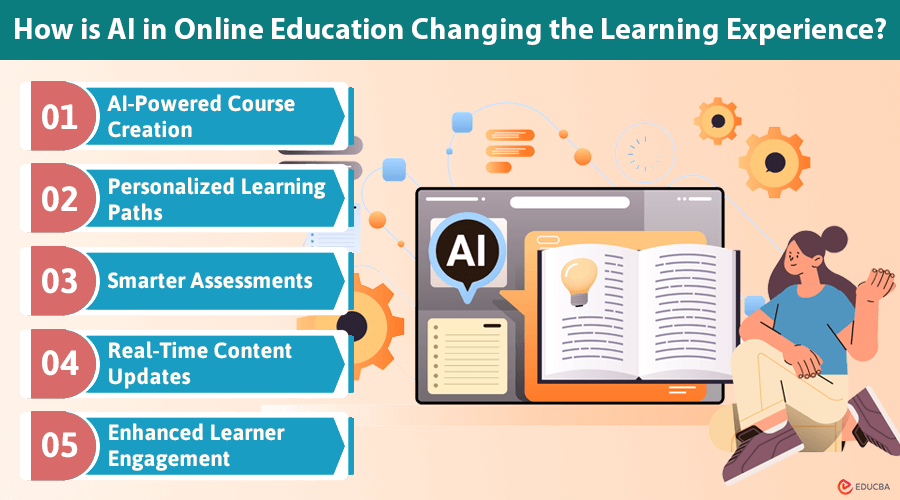Introduction to AI in Online Education
Imagine a teacher who never gets tired, adapts to every student’s learning style, and easily explains even the toughest concepts. Sounds futuristic? It is not! Here comes the AI in online education. Artificial intelligence is revolutionizing how people learn online, making it smarter, faster, and more enjoyable.
Let us explore how AI is reshaping online learning, from personalized courses to smarter assessments, with real-life examples and practical insights.
The Power of AI in Online Education
AI is the perfect study partner—always available, nonjudgmental, and endlessly patient. AI can create more efficient and engaging learning experiences by analyzing vast data.
For instance, an AI-powered language app helped a skeptical learner confidently say, “Je voudrais un croissant”. The app adjusted to their pace and ensured the lessons stayed effective. Now imagine this level of customization applied to every subject—from advanced science to complex math.
How is AI in Online Education Changing the Learning Experience?
Here is how AI in Online Education is changing the game:
#1. AI-Powered Course Creation
Creating online courses can feel daunting, but AI simplifies the process. Tools like Lingio make course authoring a breeze by offering features such as:
- Content Suggestions: AI analyzes keywords and recommends lesson topics, quizzes, and layouts, eliminating the “blank page” problem.
- Automated Video Summaries: AI trims long videos into short, engaging clips that keep learners attentive.
- Language Simplification: AI rewrites complex concepts into simpler, easier-to-understand text.
These tools, often called course authoring tools, empower educators to design engaging courses without needing advanced technical skills.
#2. Personalized Learning Paths
Traditional one-size-fits-all courses often fail to meet individual needs. AI customizes personalized learning experiences by analyzing progress, identifying strengths and weaknesses, and adapting lessons accordingly.
Take Duolingo, for instance. If a user struggles with verb conjugations, the platform provides extra practice. On the other hand, if they excel in vocabulary, it advances them to more challenging content. This tailored approach ensures that students learn effectively at their own pace.
#3. Smarter Assessments
Gone are the days of waiting weeks for test results. AI delivers instant feedback, identifies weak areas, and suggests resources for improvement. For example:
Grammarly: While primarily a writing tool, its immediate feedback helps users improve their skills in real-time.
AI also helps educators by automating grading, freeing them to focus on teaching instead of paperwork.
#4. Real-Time Content Updates
In a fast-changing world, outdated content is a problem. AI tools like Jasper or Copy.ai can quickly update course material, ensuring learners always have access to the latest information. This keeps courses relevant and valuable.
#5. Enhanced Learner Engagement
Engagement is a common challenge in online learning. AI solves this by analyzing user behavior. If a student struggles or disengages, AI can:
- Send reminders or motivational messages.
- Offer additional resources or alternative learning methods.
Platforms like MasterClass use AI-driven techniques to motivate learners, ensuring they complete their courses.
The Future of AI in Online Education
AI in online education is transforming into an accessible, personalized, and enjoyable experience. It enables customized courses, smarter assessments, and real-time content updates, revolutionizing the sharing and retaining of knowledge. To embrace this shift, learners can explore AI-powered platforms, experiment with course authoring tools, and discover what works best. The future of education is here, powered by AI, turning learning from a tedious chore into an exciting and rewarding journey.
Recommended Articles
We hope this guide on the power of AI in online education has been helpful. Check out these recommended articles for more insights and tips on enhancing your learning experience with technology:


